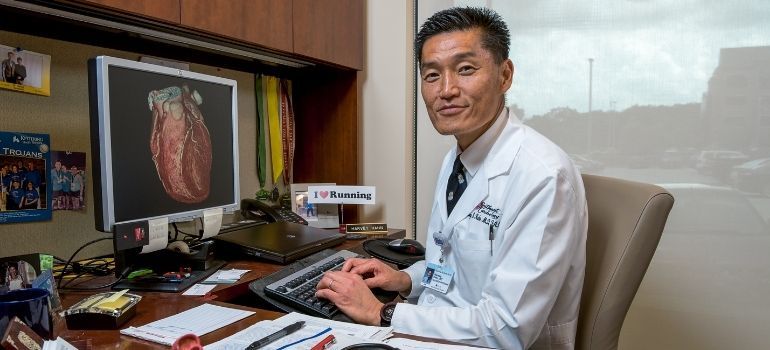Heart and Vascular Care
Want to learn more about this at Kettering Health?
It is 2022 and COVID-19 is still in our lives.
But we’ve learned a lot about COVID-19. We learned what makes others vulnerable to the virus, and we learned how COVID-19 can cause longer-lasting issues, particularly in those with heart conditions.
In other words, having heart problems makes it more likely for those with COVID-19 to get severely ill.
Doctors sometimes call this “cardiac involvement.” And Dr. Harvey Hahn, cardiologist, believes everyone should understand how COVID-19 can affect your heart health.
Is there cardiac involvement with COVID-19?
Dr. Hahn explains that there are three levels to experiencing COVID-19:
1. Asymptomatic or mild symptoms
2. Symptoms serious enough to be hospitalized
3. ICU hospitalization due to symptoms and complications
Most deaths from COVID-19 happen in the ICU.
Ten percent of those with COVID-19 who reach the second level—hospitalization—have cardiac involvement. This can include heart attacks, atrial fibrillation, congestive heart failure, stroke, venous and arterial clotting, or myocarditis.
What is myocarditis?
Myocarditis inflames the heart muscle. It’s normally caused by a virus (like the flu) or something affecting the heart muscle. COVID-19 virus can cause myocarditis.
But, it’s important to note, not every person with COVID-19 will develop myocarditis. The risk of getting myocarditis when infected with COVID-19 is around two percent.
Listen to your heart: watch for symptoms
Those who test positive for or have been hospitalized with COVID-19 should watch for these common heart disease symptoms, including the following:
- Chest pain, chest tightness, chest pressure, or chest discomfort
- Shortness of breath
- Fast or irregular heart rate
- Pain, numbness, weakness, or coldness in your arms or legs
- Pain in the neck, jaw, throat, upper abdomen, or back
“If you’re having issues breathing or retaining fluids and swelling up, that could mean that you have some short or even long-term damage to your heart,” says Dr. Hahn. If you’re hospitalized with COVID-19, symptoms may last longer than your hospital stay.
What happens after you leave the hospital?
If you are diagnosed with heart problems following COVID-19, you might have long-term damage. Make sure you see your cardiologist if you have symptoms after you’ve been discharged. More than 50 percent of patients develop long COVID, so get evaluated if you have any remaining symptoms after recovering.
“See your cardiologist and regular doctor,” says Dr. Hahn. “They will run tests to see how your heart is working. They will determine the best treatment for your situation,”
How to prevent COVID-related heart issues
The only way to prevent cardiac problems from COVID-19 is by limiting your exposure to the disease.
“Don’t get COVID-19. You should socially distance, wear a mask, and get your vaccine.,” Dr. Hahn. “I would highly recommend getting vaccinated and even boosted.”
“Live a healthy lifestyle: eat a good diet, exercise, sleep, destress, control your sugars, and get to a healthy weight,” says Dr. Hahn. “All of those things will get you healthier and help you avoid risk factors for COVID-19.”
Get to the heart of the matter
We can’t control everything COVID-19 affects in our lives. But we can do a lot to care for ourselves and our loved ones—to keep COVID-19 from getting to our hearts.









